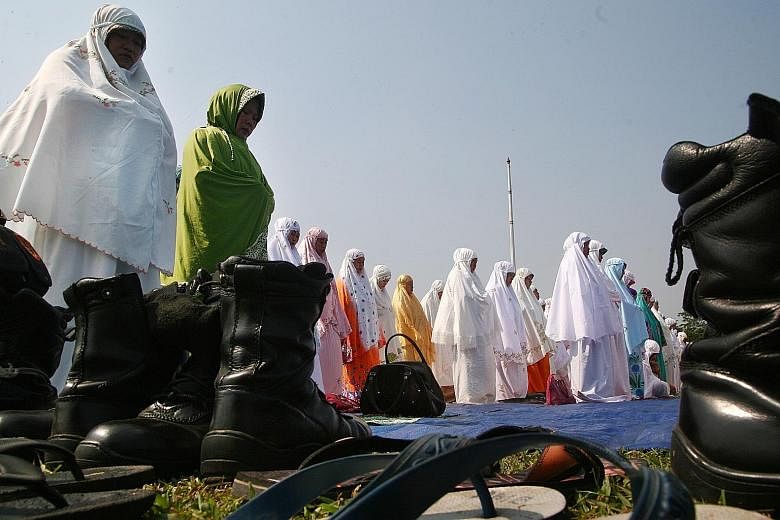Will Indonesia officially declare the ongoing haze crisis a national emergency?
President Joko Widodo may provide the answer when he touches down in Palembang in South Sumatra this morning to take stock of the situation on the ground.
Mr Joko cut short his visit to the United States to personally attend to the transboundary haze crisis, which has affected millions across South-east Asia in the past three months. According to Cabinet Secretary Pramono Anung, Mr Joko is likely to set up offices in Sumatra and Kalimantan to personally oversee relief efforts there.
Vice-President Jusuf Kalla said on Tuesday that the government was considering whether to declare the haze and forest fires a national emergency, and that the President would make the decision on his return from the US.
Mr Kalla's comments came after several politicians and local leaders had called on Mr Joko to do so as the fires continued to burn unabated.
Declaring a national emergency allows the central government to deploy national assets, such as the military, to deal with the crisis. It will also allow the government to speed up procurement processes for the resources needed to resolve the situation.
When asked, Democratic Party spokesman Imelda Sari said a national emergency should be declared because it is critical for Jakarta to have full control in order to tackle the crisis.
"The number of hot spots is in the thousands... why wait?" she said.
The government has been hesitant to label the haze crisis a national emergency as it has not affected a large part of the country just yet.
Coordinating Minister for Political, Legal and Security Affairs Luhut Pandjaitan has also said he saw no need to do so, considering the scale of resources that have been brought to bear on the crisis.
Indonesia has mobilised tens of thousands of troops, policemen and emergency assets to fight forest and peatland fires. A fleet of 27 ships, including 11 from the navy, are standing by for a mass evacuation of infants and children from Kalimantan and Sumatra.
Some observers believe that the change in the government's thinking may have to do with the worsening conditions. Nineteen people, including infants, have died of lung infections, more than half a million have suffered haze-related illnesses, and about 1.7 million ha of land has been razed.
Indonesia's national weather agency reported last week that three-quarters of the country, including national capital Jakarta, has been affected in varying degrees by the haze.
The last time Indonesia declared a national crisis was in 2004 during the Dec 26 tsunami, which left more than 230,000 people dead in over a dozen countries.
While declaring the haze crisis a national emergency would be welcomed by some, such a move has negative implications.
Some companies, for instance, could use the emergency status to declare force majeure on business deals or raise contract prices.
Force majeure refers to an unexpected or uncontrollable event.
Professor Hamdi Muluk, who teaches political psychology at the University of Indonesia, cautioned against declaring a national emergency. "National emergency status means huge state budget funds can be used without any tender. There is a huge moral hazard here. They can bypass all procedures in the name of the emergency status. We must be careful," he told The Straits Times yesterday.
"But there should be an accelerated process in tackling fires."
•Additional reporting by Wahyudi Soeriaatmadja

